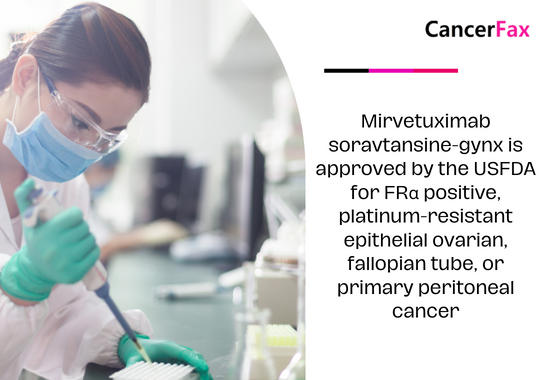Mirvetuximab soravtansine-gynx is approved by the USFDA for FRα positive, platinum-resistant epithelial ovarian, fallopian tube, or primary peritoneal cancer
March 2024: The Food and Drug Administration has granted approval for mirvetuximab soravtansine-gynx (Elahere, ImmunoGen, Inc. [now a part of AbbVie]) to be used in adult patients with FRα positive, platinum-resistant epithelial ovarian, fallopian tube, or primary peritoneal cancer. This approval is specifically for patients who have undergone one to three prior systemic treatment regimens. A test that has received FDA approval serves as the basis for selecting patients. Mirvetuximab soravtansine-gynx was previously granted accelerated approval for this specific indication.
The effectiveness of the treatment was assessed in Study 0416 (MIRASOL, NCT04209855), which was a trial conducted in many centers. The experiment was open-label, meaning that both the patients and the researchers knew which treatment was being administered. It was also active-controlled, meaning that there was a comparison group receiving a different treatment. The trial was randomized, meaning that the patients were assigned to treatment groups randomly. The trial included 453 patients with platinum-resistant epithelial ovarian, fallopian tube, or primary peritoneal cancer. Patients were allowed to undergo a maximum of three previous courses of systemic treatment. The trial included patients whose tumors had positive FRα expression, as evaluated by the VENTANA FOLR1 (FOLR1-2.1) RxDx Assay. Participants were randomly assigned in a 1:1 ratio to receive either mirvetuximab soravtansine-gynx at a dose of 6 mg/kg (adjusted for ideal body weight) as an intravenous infusion every 3 weeks, or to receive chemotherapy chosen by the investigator (paclitaxel, pegylated liposomal doxorubicin, or topotecan) until their disease worsened or they experienced unacceptable side effects. The trial results meet the post-marketing criterion for mirvetuximab soravtansine-gynx, as stipulated by the earlier accelerated approval.
The primary measures of effectiveness were overall survival (OS), progression-free survival (PFS) as determined by the investigator, and the verified overall response rate (ORR) according to the investigator’s evaluation. The evaluation of progression-free survival (PFS) and overall response rate (ORR) was conducted in accordance with the Response Evaluation Criteria in Solid Tumors (RECIST), version 1.1. The median overall survival (OS) was 16.5 months (95% confidence interval [CI]: 14.5, 24.6) in the mirvetuximab soravtansine-gynx arm and 12.7 months (95% CI: 10.9, 14.4) in the chemotherapy arm. The hazard ratio (HR) for OS was 0.67 (95% CI: 0.50, 0.88) with a p-value of 0.0046. The median progression-free survival (PFS) was 5.6 months (95% confidence interval [CI]: 4.3, 5.9) and 4.0 months (95% CI: 2.9, 4.5) for the different treatment groups. The hazard ratio (HR) was 0.65 (95% CI: 0.52, 0.81) with a p-value of less than 0.0001. The overall response rate (ORR) was 42% (95% confidence interval [CI]: 36, 49), and the response rate for the second group was 16% (95% CI: 12, 22) (p-value <0.0001).
The prescribing material includes a boxed warning for eye damage, as well as warnings and precautions for pneumonitis, peripheral neuropathy, and embryo-fetal harm. The most frequent side effects (≥ 20%) including abnormal laboratory results, were elevated aspartate aminotransferase, fatigue, elevated alanine aminotransferase, blurred vision, nausea, elevated alkaline phosphatase, diarrhea, abdominal pain, keratopathy, peripheral neuropathy, musculoskeletal pain, reduced lymphocytes, reduced platelets, reduced magnesium, reduced hemoglobin, dry eye, constipation, reduced leukocytes, vomiting, reduced albumin, reduced appetite, and reduced neutrophils.
The suggested dosage for mirvetuximab soravtansine-gynx is 6 mg/kg adjusted ideal body weight given intravenously as an infusion every 3 weeks (21-day cycle) until disease progression or unacceptable toxicity.
Susan Hau is a distinguished researcher in the field of cancer cell therapy, with a particular focus on T cell-based approaches and cancer vaccines. Her work spans several innovative treatment modalities, including CAR T-cell therapy, TIL (Tumor-Infiltrating Lymphocyte) therapy, and NK (Natural Killer) cell therapy.
Hau's expertise lies in cancer cell biology, where she has made significant contributions to understanding the complex interactions between immune cells and tumors.
Her research aims to enhance the efficacy of immunotherapies by manipulating the tumor microenvironment and exploring novel ways to activate and direct immune responses against cancer cells.
Throughout her career, Hau has collaborated with leading professors and researchers in the field of cancer treatment, both in the United States and China.
These international experiences have broadened her perspective and contributed to her innovative approach to cancer therapy development.
Hau's work is particularly focused on addressing the challenges of treating advanced and metastatic cancers. She has been involved in clinical trials evaluating the safety and efficacy of various immunotherapy approaches, including the promising Gamma Delta T cell therapy.
- Comments Closed
- April 6th, 2024






ADC therapy for gynecologic cancer, Elahere for ovarian cancer, FDA-approved ovarian drugs 2024, Folate receptor-targeted therapy, FRα-positive treatment, Mirvetuximab soravtansine approval, Platinum-resistant ovarian cancer, Recurrent ovarian cancer options
CancerFax is the most trusted online platform dedicated to connecting individuals facing advanced-stage cancer with groundbreaking cell therapies.
Send your medical reports and get a free analysis.
🌟 Join us in the fight against cancer! 🌟
Привет,
CancerFax — это самая надежная онлайн-платформа, призванная предоставить людям, столкнувшимся с раком на поздних стадиях, доступ к революционным клеточным методам лечения.
Отправьте свои медицинские заключения и получите бесплатный анализ.
🌟 Присоединяйтесь к нам в борьбе с раком! 🌟